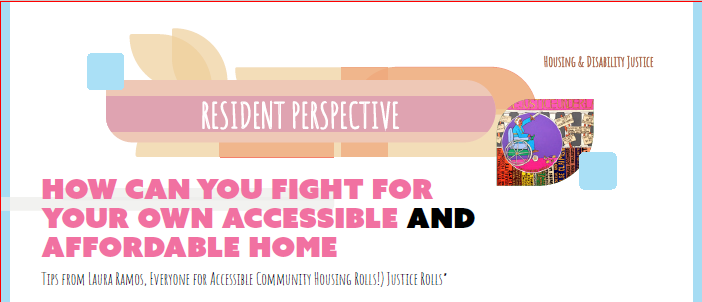
- Learn about your federal, state, and local housing, disability, and civil rights. Research the laws, regulations, statutes, and cases needed to provide the legal and moral grounding to support your right to housing justice.
- Don’t just complain, file complaints right away! There are deadlines for submitting complaints – 1 year from the day the discrimination happened for complaints sent to HUD’s Office of Fair Housing and Economic Opportunity and two years for ones sent to the federal court. Nothing will change unless you take the risk and put the complaint in writing to provide the proof that the discrimination happened. Let your voice be heard.
- Invite veterans of the civil, constitutional, disability, and housing rights movements to speak to you and your neighbors. Learn what worked for them so you can plan what will work for you. Build on strategies and best practices that already exist.
- Invite people who know about the various housing programs in your area to discuss the affordable and accessible housing opportunities that are currently available or will become available in your area.
- Find out if there are resource allocations for building accessible housing units, “adaptable” housing units, and/or modifying inaccessible housing units in your community. If there are no resources available, ask why!
- Find out who the decision-makers are in your local, county and state affordable housing programs and who represents you. Let them know that there are very few or no accessible housing units being built in your community and no/insufficient funds to make inaccessible units accessible. Inform them of any systemic barriers the elderly and people and families with disabilities face in trying to access equal opportunity. Demand funding for more accessible and affordable units.
- Become a leader. Convene and teach others about what you have learned and fought for in pursuing equal housing opportunities. You can start out small by reaching out to people in your family, building, or neighborhood. Then expand outward!
- Reach out across isolated groups to provide support and gain understanding, compassion, and strength. We may not all share the same income limitations, languages, religions, disabilities, ages, genders, sexual orientations, or educations, but we can all learn from each other and come together in the shared need for decent, safe, accessible, and beautiful housing.
- Remember that you are not alone. There are thousands of us across the country that need the same things and are facing the same obstacles. Reach out and write to: [email protected] to connect to advocates like yourself.
As Margaret Mead said,
“Never doubt that a small group of thoughtful, committed citizens can change the world; indeed it is the only thing that ever has.”
Each one of us, citizen or not, can work together for what is right and just, and for that little piece of heaven - a safe, accessible home in which to live.